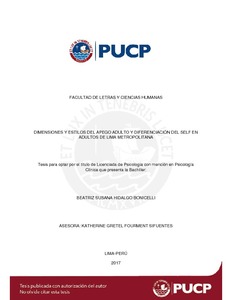| dc.contributor.advisor | Fourment Sifuentes, Katherine Gretel | es_ES |
| dc.contributor.author | Hidalgo Bonicelli, Beatriz Susana | es_ES |
| dc.date.accessioned | 2017-06-22T14:44:50Z | es_ES |
| dc.date.available | 2017-06-22T14:44:50Z | es_ES |
| dc.date.created | 2017 | es_ES |
| dc.date.issued | 2017-06-22 | es_ES |
| dc.identifier.uri | http://hdl.handle.net/20.500.12404/8878 | |
| dc.description.abstract | Una de las consecuencias más importantes de mantener relaciones de apego seguro es su
contribución al desarrollo saludable de diversos aspectos del autoconcepto. Entre éstos se
encuentran los componentes estructurales, aquellos que dan cuenta de la organización de los
contenidos y creencias del autoconcepto. Diversas investigaciones han evidenciado que las
relaciones de apego seguro son trascendentales para el desarrollo de una estructura del self bien
organizada y con importantes funciones regulatorias y adaptativas, y de esta manera, se han
encontrado asociaciones en la adultez entre el estilo de apego seguro y algunos aspectos del self. No
obstante, existe poca investigación que respalde la asociación entre el apego adulto con la variable
diferenciación del self, particularmente en el contexto latinoamericano. Por ello, el presente estudio
tuvo como objetivo analizar las relaciones entre las dimensiones y estilos del apego adulto y la
diferenciación del self. En la investigación participaron 100 adultos de Lima Metropolitana, de
entre 20 y 57 años de edad (M= 34.67, DE= 11.15). Para medir los constructos, se utilizó el
Cuestionario de Relación (RQ) y el Inventario de Diferenciación del Self-Revisado (DSI-R). Se
halló que la dimensión de ansiedad, el estilo de apego seguro y el estilo de apego preocupado se
relacionan significativamente con la diferenciación del self, lo que coincide con el planteamiento de
que las relaciones con los cuidadores y las distintas figuras significativas van de la mano con la
capacidad de autorregulación y la adquisición de la autonomía. | es_ES |
| dc.description.abstract | One of the most important consequences of maintaining secure attachment relationships is their
contribution to the healthy development of various aspects of the self-concept. Among these, are the
structural components, those that account for the organization of the contents and beliefs of the selfconcept.
Different investigations have evidenced that secure attachment relationships are
transcendental for the development of a well-organized structure of the self and with important selfregulatory
and adaptive functions, and in this way, associations have been found in adulthood
between the secure attachment style and some aspects of the self. However, there is little research
supporting the association between adult attachment and differentiation of self, particularly in the
Latin-American context. Therefore, the goal of the present study was to analyze the relationships
between adult attachment (dimensions and styles) and differentiation of self. The research involved
100 adults from Metropolitan Lima, between the ages of 20 and 57 years (M= 34.67, SD= 11.15).
To measure the constructs, the Relationship Questionnaire (RQ) and the Differentiation of Self
Inventory-Revised (DSI-R) were used. Anxiety dimension, secure attachment style and preoccupied
attachment style were found to be significantly related to the differentiation of self, which match the
idea that relationships with caregivers and the various significant figures go hand in hand with the
ability of self-regulation and the acquisition of autonomy. | es_ES |
| dc.language.iso | spa | es_ES |
| dc.publisher | Pontificia Universidad Católica del Perú | es_ES |
| dc.rights | Atribución-NoComercial-SinDerivadas 2.5 Perú | * |
| dc.rights | info:eu-repo/semantics/openAccess | es_ES |
| dc.rights.uri | http://creativecommons.org/licenses/by-nc-nd/2.5/pe/ | * |
| dc.subject | Apego | es_ES |
| dc.subject | Yo | es_ES |
| dc.subject | Autopercepción | es_ES |
| dc.subject | Psicología clínica--Investigaciones | es_ES |
| dc.title | Dimensiones y estilos del apego adulto y diferenciación del self en adultos de Lima Metropolitana | es_ES |
| dc.type | info:eu-repo/semantics/bachelorThesis | es_ES |
| thesis.degree.name | Licenciado en Psicología Clínica | es_ES |
| thesis.degree.level | Título Profesional | es_ES |
| thesis.degree.grantor | Pontificia Universidad Católica del Perú. Facultad de Letras y Ciencias Humanas | es_ES |
| thesis.degree.discipline | Psicología Clínica | es_ES |
| renati.discipline | 313026 | es_ES |
| renati.level | https://purl.org/pe-repo/renati/level#tituloProfesional | es_ES |
| renati.type | http://purl.org/pe-repo/renati/type#tesis | es_ES |
| dc.publisher.country | PE | es_ES |
| dc.subject.ocde | https://purl.org/pe-repo/ocde/ford#5.01.00 | es_ES |






